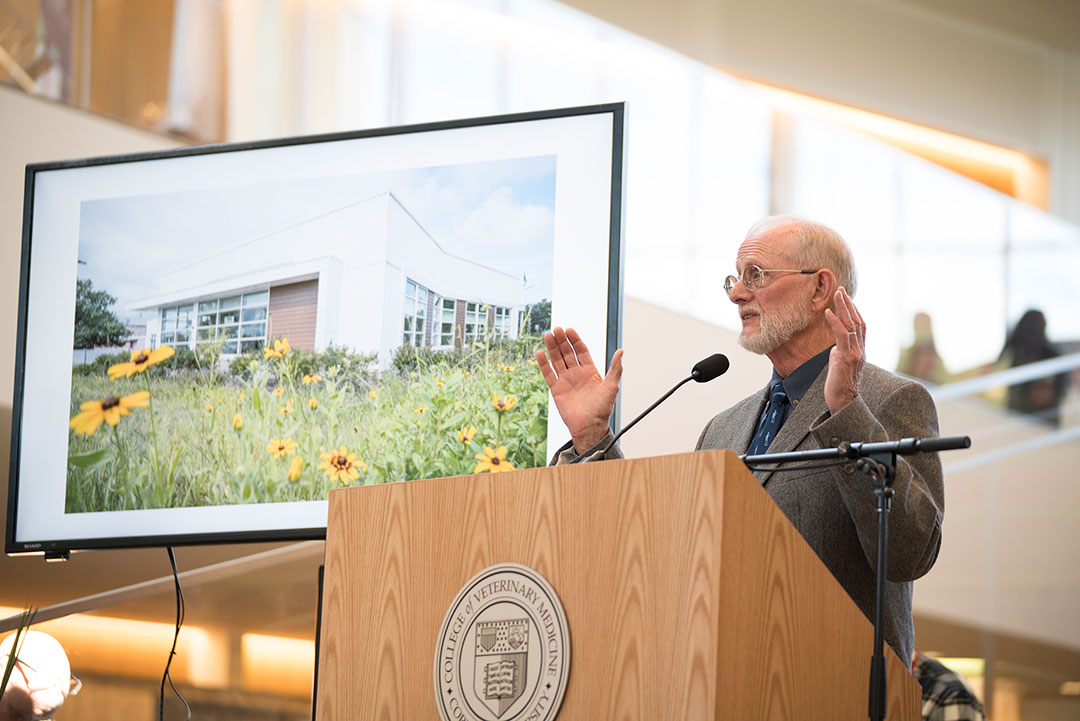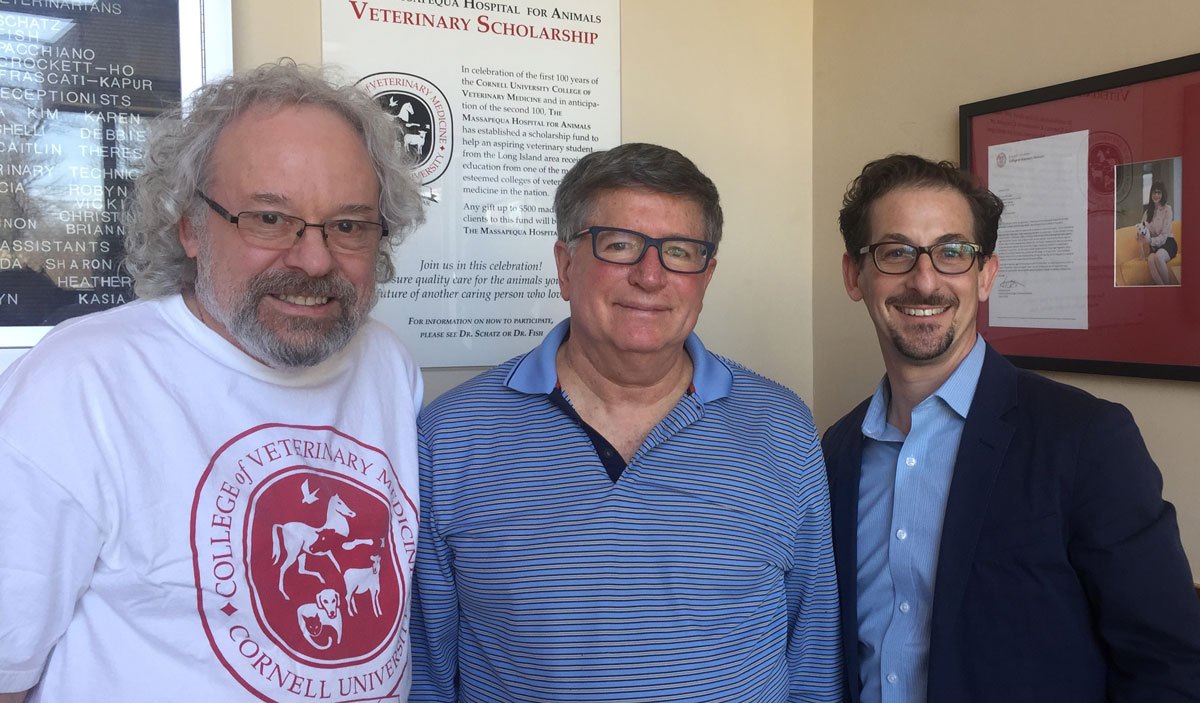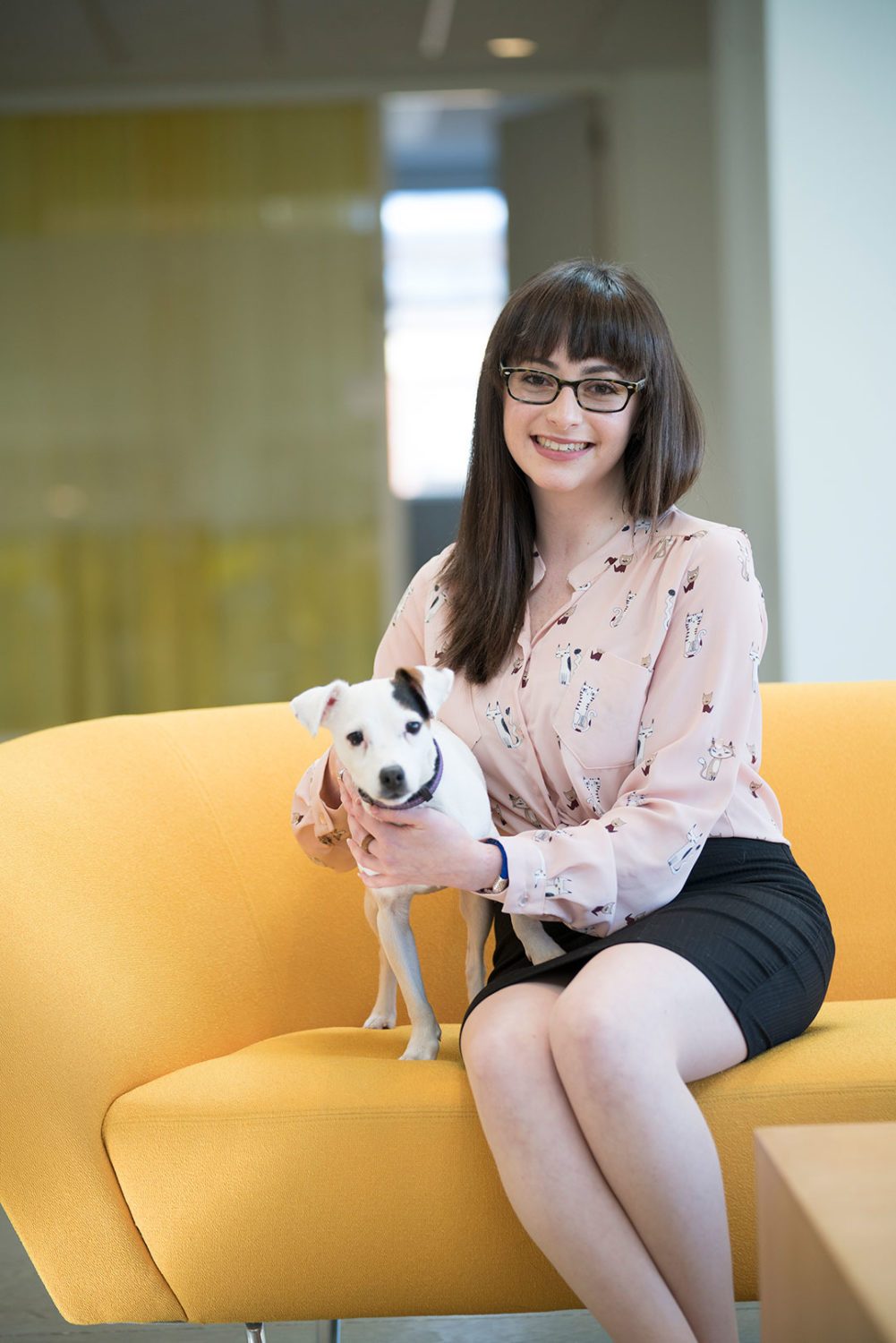Grassroots Scholarships
By Olivia Hall
Three decades after they ventured forth into the world as full-fledged veterinarians, members of Cornell’s veterinary class of 1961 decided it was time to mark their reunion with a fitting gesture.
“We started to get onto this idea of wanting to do something as a permanent recognition of our class experience.”
Susan Ackermann, D.V.M. ’86
“Student debt was increasing, so we created a student scholarship fund,” said Bob Lynk ’54, D.V.M. ’61. With a wink to a plaque the class earned in its sophomore year from professor of parasitology Dr. John Whitlock for being “outstanding” at identifying parasite and insect specimens, the Plaque Class of 1961 Scholarship was born. In their subsequent junior year, “the rest of the faculty took great pleasure in putting cracks in our plaque with surprise quizzes,” Lynk recalled.
The Plaque Class of 1961 Scholarship is now part of a lineup of more than 240 funds paying out a total of $2.5 million to Cornell veterinary students every year. Most are assigned based on financial need, and some additionally on the scholarship’s selection criteria, such as home state or species interest. According to estimates from the Office of Student Financial Planning, about three-quarters of students receive some monetary assistance, with an average of around $30,000 over the course of four years.
“The beauty of this kind of grassroots scholarship effort is that there’s not usually one very large gift that starts the fund or puts it over the top,” said Sheila Reakes, director of annual giving. “Instead, relatively small gifts from a large number of people are pooled for lasting impact.” Once the funds reach the endowment level of $100,000 set by the university, they are managed centrally out of Cornell’s Long-Term Investment Pool to grow in perpetuity and pay out annual scholarships from the accumulated interest.
Champions
To reach that target, however, “you really need one or two champions who are members of the class and can see the effort through,” Reakes said. She identified Susan Ackermann, D.V.M. ’86, as a prime example, though the feline veterinarian, who has been active in many facets of Cornell’s alumni affairs, humbly calls herself “merely an instrument” in her class’ successful drive to establish the Class of 1986 Heritage Scholarship.
It began in 2013 after Dan Cirnigliaro, D.V.M. ’86, passed away suddenly. “Dan was a transfer student from Tufts in our sophomore year and had been adopted warmly into our class of 1986 family,” said Ackermann. “His was the first death in our class and generated a lot of discussion about the passage of time, how we had matured, what our own legacies were. We started to get onto this idea of wanting to do something as a permanent recognition of our class experience.” A team of four classmates – Mike Shafer, D.V.M. ’86; Brad Taylor, D.V.M. ’86; Bill Johnson, D.V.M. ’86; and Chris Armao, D.V.M. ’86 – helped Ackermann reach out to friends individually, attaining nearly full participation in the fund. “We have only one holdout,” Ackermann acknowledged. The first scholarship will be awarded this fall.

On the other end of the spectrum from this intimate, class-based fundraiser is the Robert W. Kirk, D.V.M. 1946, and Dr. William E. Hornbuckle Scholarship, which Ackermann also spearheaded in her capacity as the past president of the CVM Alumni Association Executive Board. Launched this past summer, “it’s a larger, broad-based effort to reach out to 60 years of veterinary students who’ve been touched by these two giants of veterinary medicine,” she said.
Hornbuckle, the Rudolph J. and Katherine L. Steffen Professor Emeritus of Veterinary Medicine affectionately known as “Horn,” is beloved by former students, residents and interns alike for his decades of student-centered teaching in the Community Practice Service. When the new Small Animal Community Practice building opened last summer, “we wanted to do something terribly substantial to honor him,” Ackermann said. “We asked him, and he would only accept a scholarship if we named his friend and mentor Robert Kirk first.”
Thanks to two separate dollar-for-dollar matching grants – one from the Alumni Association Executive Board and the other from a former client of Hornbuckle – the impact of even the smallest donation is being doubled, bringing the fund more than halfway to its endowment goal in just a few months. Once established, the scholarship will support a student in need with an interest in primary care.
Touching lives
Shaped and influenced by the teachers they are now honoring, Cornell veterinary alumni themselves have been touching lives – animal and human – for more than a century. Grateful clients are therefore frequent contributors to CVM endowed funds, such as the Massapequa Hospital for Animals Scholarship.
“We felt Cornell was good to us, got us where we are, and we wanted to give something back.”
Stanley Fish ’72, D.V.M. ’75
In 1994, Howard Schatz ’71, D.V.M. ’75, and Stanley Fish ’72, D.V.M. ’75, the co-owners of a five-veterinarian animal hospital in Massapequa, New York, decided to celebrate CVM’s 100th anniversary with a special gift. “We felt Cornell was good to us, got us where we are, and we wanted to give something back,” Fish said.
Ever since, a display in their waiting room has been informing visitors that the scholarship will aid a veterinary student from Long Island and that gifts to the fund of up to $500 will be matched by the practice owners. Some 30 clients annually offer donations ranging from $5 to much larger sums. One woman, Fish recounted, has not owned a dog in more than a decade but continues to send a note and check every year.
“It seems to touch a chord,” Fish said. “I think people like to know that their donation is not just going to get lost in the shuffle, like for a room that needs new equipment. It’s more tangible. They see a picture of the student and a letter from them on our wall, and it feels good to know that you’re helping them get a quality education.”
In fact, the two veterinarians’ generosity even inspired a new scholarship and unexpectedly multiplied their impact. In 2017, a client of the practice and longtime donor to its scholarship fund, Michael Senken, established the Patricia Senken Scholarship to memorialize his deceased wife, who loved animals, especially her cats. “We were very excited to hear that,” Fish said.

Every little bit helps
This year’s recipient of the Massapequa Hospital for Animals Scholarship, Alexandra Kravitz ’15, D.V.M. ’20, was happy to be able to express her gratitude in person when she met Fish on campus in the fall. “It’s an honor to be selected for this scholarship,” said Kravitz, who hopes to become a boarded orthopedic surgeon and consultant on difficult surgeries around the world, including in Japan, where she took a gap year. “It has helped me lighten my ever-growing student loan debt. With rising tuition costs and a horrendous debt-to-income ratio we are facing in the U.S., every little bit helps.”
Having watched the cost of a degree steadily climb over the years to a median loan burden of $161,882 among CVM graduates in 2018, Dick Grambow ’55, D.V.M. ’57 agreed. In his day, in-state students were responsible only for Cornell fees, but no tuition, and his class included numerous students with families and World War II veterans with limited financial means. “We were very fortunate, and we knew that,” he said.
Now retired from the Fairmount Animal Hospital in Syracuse, New York, Grambow helped to establish the Class of 1957 Veterinary College Memorial Scholarship – honoring deceased classmates and family members – as well as the Grambow Family Scholarship in 1993.

Every year, Grambow has received letters from students such as Emily MacArthur, D.V.M. ’20, who thanked him and his classmates for the freedom the Class of 1957 scholarship has been providing her while in school. “The scholarship allows me not only to afford tuition but also to limit my work hours and maximize my studying and other experiences, such as volunteering at the Jane L. Swanson Wildlife Health Center,” she said.
Already a licensed wildlife rehabilitator, MacArthur plans to later practice in a wildlife hospital and establish an education program for interested small animal emergency clinics. “I feel honored and humbled to have been selected,” she added. “I know there are veterinarians out there who believe in me and my potential, and I feel an extra sense of duty to excel in my program.”
Whether celebrating a loved one, a meaningful time spent at Cornell or a beloved profession – a deep sense of gratitude drives most scholarship gifts. And so, over time, current donors hope that MacArthur, Kravitz and their colleagues may find themselves in a position to consider contributions of their own. “We hope that the recipients will appreciate the gift and go on and pay it forward to succeeding generations,” Ackermann said.
Photos both provided and taken by the Cornell College of Veterinary Medicine.


